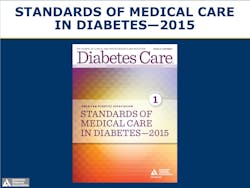Diabetes and oral health: The importance of maintaining optimum oral health
This article originally appeared in RDH eVillage Focus, a newsletter prepared for dental professionals looking for hard-hitting, current information. You can subscribe here.
According to the Centers for Disease Control and Prevention (CDC), diabetes is the seventh leading cause of morbidity and mortality in the United States. (1) Dental or oral infections in a patient with diabetes can frequently lead to loss of control over the diabetic condition. Oral complexities of diabetes include periodontal disease, tooth decay, salivary dysfunction, and pathologic changes. This article will review diabetes and oral health.
READ MORE |Understanding gestational diabetes mellitus
Uncontrolled bacteria production resulting in oral inflammation and infection can result in mobile teeth. Uncontrolled diabetes can result in enhanced inflammation, delayed healing of wounds, and changes to large and small blood vessels. (2) Failure to reverse these adverse effects by managing diabetes can lead to periodontal disease. This risk directly relates to fasting blood glucose levels. Patients with diabetes have a hyperactive inflammatory response and the bacterial challenge of a periodontal infection results in exaggerated inflammation and periodontal tissue destruction. Over time, this can lead to loose teeth, and eventually tooth loss. (2)
READ MORE |Type 1 diabetes discovery: Stem cells make millions of human insulin cells
Dry mouth in those with and without diabetes will lead to tooth decay because saliva neutralizes and clean acids produced by bacteria, which creates a balanced pH and prevents the destruction of tooth enamel. If the production of bacteria accelerates faster than saliva due to dry mouth, colonization of bacteria will inevitably damage tooth structure. Repeated damage to the tooth structure results in tooth decay.
READ MORE |Help in explaining diabetes
Manifestations of several life-threatening diseases appear in the mouth, including diabetes. The American Diabetes Association (ADA) recommends screening tests for diabetes mellitus for all persons 45 and older. (5) Those with risks such as obesity and a family history belonging to ethnic or minority groups are also at risk for diabetes. Recent medical research demonstrated that on average, people who maintain healthy oral hygiene home care habits live 10 years longer than those who do not. Those with uninhibited diabetes may require hospitalization until the infection is under control. (6) Establishing regular dental visits for checkups and cleanings will significantly lower the risk of oral complications.
References
1. Johnson NB, Hayes LD, Brown K, Hoo EC, Ethier KA, Centers for Disease Control and Prevention (CDC). CDC National Health Report: Leading Causes of Morbidity and Mortality and Associated Behavioral Risk and Protective Factors—United States, 2005–2013. MMWR Surveill Summ. 63(Suppl 4);3-27.
2. Slim LH, Stegeman CA. Diabetes: A Multifaceted Syndrome Treatment Considerations in Dentistry. Dentalcare.com. http://www.dentalcare.com/media/en-US/education/ce93/ce93.pdf. Accessed September 7, 2015.
3. Chan W. Tooth Dehydration During Teeth Whitening in London. Dr. Wyman Chan website. http://www.drwymanchan.com/blog/tooth-dehydration-during-teeth-whitening/. Accessed August 27, 2015.
4. Smith AJ, Shaw L. Mild dehydration: a risk factor for dental disease? Eur J Clin Nutr. 2003;57(Suppl 2):S75–S80. doi:10.1038/sj.ejcn.1601905.
5. Patel P, Macerollo A. Diabetes Mellitus: Diagnosis and Screening. Am Fam Physician. 2010;81:863-870.
6. Stelbrink E. Diabetes and Oral Health. Endever. http://www.endevr.com/diabetes/Diabetes-and-Oral-Health. Published March 10, 2015. Accessed September 16, 2015.



